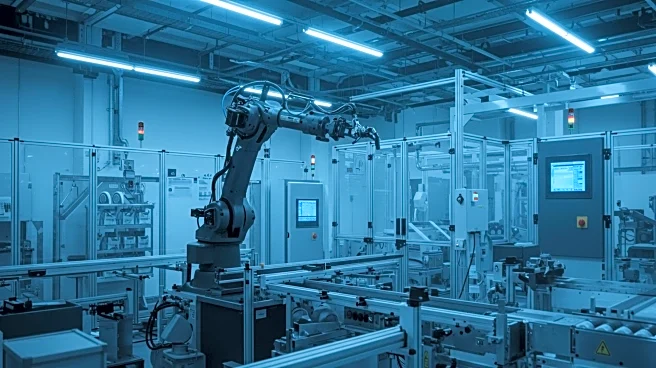What's Happening?
Gartner analysts recently held a briefing focused on the impact of physical and digital automation in manufacturing. The briefing highlighted the importance of scaling automation beyond a few sites as a core strategy for manufacturing leaders. Wade McDaniel, a Gartner analyst, emphasized that automation is not just about machines but also about people. Companies are planning significant deployments of robots worldwide, aiming for thousands by 2030. Robust governance structures are crucial for balancing local experimentation with global alignment. The briefing also discussed the implementation of 100% inline digital quality checks, which enhance product quality, reduce waste, and support sustainability goals. McDaniel stressed that automation's success is closely tied to workforce engagement and development.
Why It's Important?
The scaling of automation in manufacturing is significant as it promises to enhance efficiency, product quality, and sustainability. By integrating automation with workforce development, companies can achieve higher performance and resilience. This shift is crucial for maintaining competitiveness in the global market, where technological advancements are rapidly changing industry standards. Companies that successfully implement these strategies stand to gain a competitive edge, while those that fail to adapt may struggle to keep up. The focus on human-centric automation highlights the need for skilled labor, which could influence employment trends and educational priorities in the U.S.
What's Next?
Manufacturing companies are expected to continue investing in automation technologies and workforce development. As these strategies are implemented, there may be increased demand for skilled workers, prompting educational institutions to adapt their programs. Companies will likely focus on refining their governance structures to ensure successful scaling of automation. Stakeholders, including industry leaders and policymakers, may need to address challenges related to workforce training and technological integration. The ongoing evolution of automation could lead to further innovations and shifts in manufacturing practices.
Beyond the Headlines
The emphasis on human-centric automation raises ethical considerations regarding the balance between technology and workforce needs. As automation becomes more prevalent, companies must navigate the potential impacts on employment and worker rights. Additionally, the integration of automation with sustainability goals highlights the growing importance of environmental responsibility in manufacturing. These developments could influence public policy and corporate strategies, as stakeholders seek to align technological advancements with societal values.











